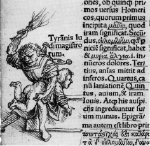















Erasmus' Traces
Episode 1: Netherlands
People are not born, they are made
Homines non nascuntur, sed finguntur
Erasmus felt a thorough distaste for the education he had himself received. It is understandable that his education was not up to the requirements of the high-achiever he must have been. But whether it was really as bad as he made out is a point of discussion. It remains a fact that he hated school teachers, rejected the teaching methods used at the time and scorned the scholasticism then taught. Moreover, the convent schools his poverty forced him to attend left him with a life-long aversion to monks. These little monks are even blinder than moles, and they are ungrateful dogs who shamelessly parade a piety which they do not possess is one of the milder statements he was later to make.
Erasmus was born in Rotterdam as the illegitimate son of a priest. The year of his birth is still controversial; 1469 is often quoted, but in academic circles 1466 is also mentioned. The series sticks to 1466. He grew up in Gouda and started his education when he was four, partly privately, partly at the school of Pieter Winckel in Gouda. Around 1478 he and his brother went to the Latin School of the Brothers of the Common Life in Deventer, St. Lebwin's School, headmaster Alexander Hegius. He became a chorister in the St. Salvator in Utrecht where he was taught by Jacob Obrecht. In 1483 his mother died of the plague, and when his father died a year later, his guardians sent him to the Latin School in 's Hertogenbosch. When the plague broke out in that city too, Erasmus moved to the Augustinian Emmaus monastery in Steyn near Gouda. In 1492 he was ordained a priest; later he was to call this a noose that was laid round his neck. After a short stay in Cambrai as secretary to the Bishop of Mons he left for the university in the autumn of 1495, to the Collège Montaigu in Paris, to study theology. Only in 1506 did he graduate when he obtained his doctor's title in theology at the University of Turin.
Scorn for the existing educational system was something that Erasmus had in common with many other humanists of that era. To his regret Erasmus could not escape the duty of teaching now and then, because for someone of his background that was sometimes the only way to generate an income. He gave private tuition to students, especially in his Paris period. Later on he taught Greek and theology at Cambridge. But this reluctant teacher never took any pleasure in it, and he always rejected other interesting offers, from colleges in Louvain and London and Italian Universities for instance.
What did give Erasmus pleasure was developing ideas about an ideal form of education, which he did with flair and enthusiasm. He wrote a number of purely pedagogical works, but in other publications, too, his thoughts on the subject come up. The range of subjects he touched upon is large and varied: the upbringing of very young children, courtesy, curricula for schools, the wealth of words and objects, about piety, literary education, the pronunciation Latin and Greek, writing letters, making speeches, the education of a Christian prince, and how to deliver a sermon.
If you read Erasmus' writings and leave out what is merely typical for his day and age, you will be confronted with a surprisingly modern set of ideas: Upbringing and education should start at as early an age as possible, everybody has a right to good education, children should learn as they play, corrections should be given gently. Erasmus was way ahead of his time is his pedagogical thinking. Teachers who used caning and sarcasm were an abomination to him. Writing was too often neglected in teaching, although reading and writing, he said, are the essence of education. Knowledge of languages is crucial, especially for scientists. A teacher should not only possess specialised knowledge of particular subjects but should also be erudite. He should love his pupils and act in such a way that they can love him. Because teaching is much more than just the passing on of knowledge; it should also be attuned to the pupil's aptitude and interests, hence the importance on individual teaching. Ultimately the humane level of a society is determined by its education, because as Erasmus wrote in On upbringing and education: People are not born, they are made
The relationship between upbringing, education and society is the central theme of the first episode. Biographical information about Erasmus's own upbringing and education, and the expression of his pedagogical ideas are the starting point for a journey through the present-day educational world.
Erasmus himself once came to the conclusion that ....it was easier to specify the qualities of the ideal school teacher than to find someone who possessed them. Searching for the ideal teacher in Erasmus' sense is the driving force behind this journey of discovery, which takes place in Rotterdam. Rotterdam, not only because that is where Erasmus was born, but also because in a large city the problems of education tend to cluster and can be found at all levels of education.